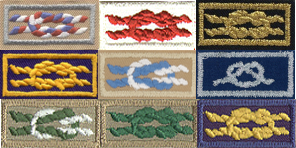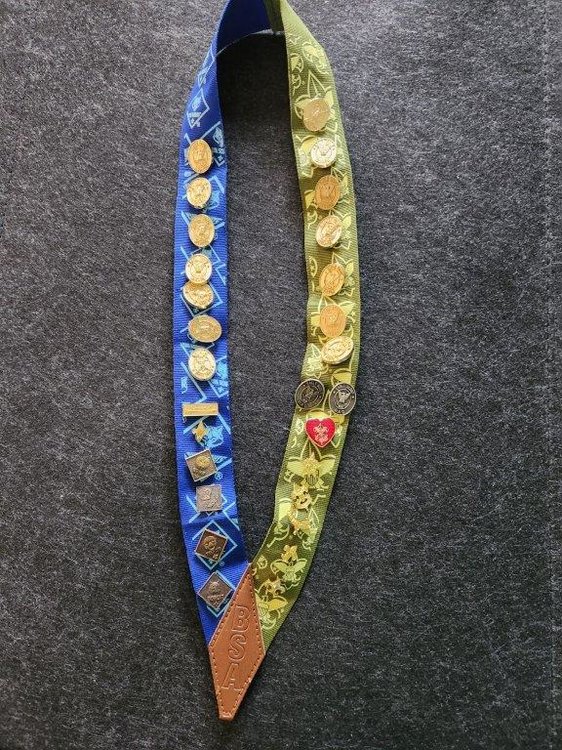
InquisitiveScouter
Members-
Posts
2654 -
Joined
-
Last visited
-
Days Won
125
Content Type
Profiles
Forums
Articles
Store
Everything posted by InquisitiveScouter
-
Brother, I wholeheartedly encourage you to practice your faith as you see fit. If any Scout, Scouter, or person has a problem with it, then they are being un-Scoutlike. BTW, have you seen the Buddhist Sangha Award for youth?? (Metta for Cub Scouts...) https://www.yumpu.com/en/document/read/8551291/requirements-for-the-sangha-award-national-buddhist-committee- Or the Bodhi Award for adults? https://www.buddhistchurchesofamerica.org/_files/ugd/458b11_07bacc39c7714155b86c0d9075103570.pdf
-
If you were uncomfortable with the format, content, or message, it would be perfectly acceptable to leave. From time to time, I see Scout Camps offer a whole menu of worship services... Catholic, Protestant, Jewish, Muslim, Buddhist, Hindu, or the "Non-denominational" catch all. I have walked out of services before, due to matters of conscience. I do not consider it rude at all...
-
I wish life were that easy. I have seen many Scouts over the years who didn't want to be there. Their parents made them. (We have a few at the moment.) Some have changed their minds over time, and some left. Parents ultimately make the decision about joining Scouting, not the youth.
-
https://mattixdesign.com/marketing/how-to-target-multiple-audiences-and-ideal-customers
-
Um... no. https://www.youtube.com/watch?v=xUWJ4lZ0NgQ&ab_channel=Matt"Wags"Wagner
-
So, if the adults are the decision-maker to sign up the kid to Little League (or Scouts), then they are certainly A target audience
-
So, Little League websites, social posts, email blasts, electronic newsletters, "Annual Key Touchpoints", imagery, sponsoring searches, etc. etc. etc. are all aimed at the youth?? Who knew those kids were so savvy?? https://www.littleleague.org/downloads/annual-guide-marketing-assets/ If kids just wanted to play baseball, they'd go to the park, backyard, open field, sandlot, (like we did as kids) and hit the ball around.
-
Ask. Also, you are not required to attend any of these events. If any particular camp requires you to attend some event in order to qualify for some award or recognition, you can simply go off on your own and have your own "spiritual experience" according to the tenets of your beliefs, and count that. If anyone denied that opportunity to you, I'd gladly come and side with you to oppose them. And although I'm not going down the metaphysical rabbit hole again 😜 I'll simply say your beliefs are your business. And if you believe that any value system contortions are acceptable in order to participate, then have at it... I have my own garden to tend.
-
I do not believe you have to worry about this... For example, we have Hindus, Muslims, one Buddhist, Jews, Protestants, and Catholics (Roman and Eastern Orthodox) in our Troop. We all get along together 😜 The Scout Oath does have a phrase each Scout promises, "On my honor, I will do my best to do my duty to God and my country and to obey the Scout Law,..." This is the first part of the Scout Oath. The 12th point of the Scout Law is, "A Scout is Reverent." At each rank milestone along his Scouting journey, your Scout will be asked to define what he believes to be his duty to God. This is totally under the purview of you as his parents, and the Scout. It is my job as an adult mentor to challenge the Scout to do this, and to challenge him to live up to what he believes his duty is. If at any point, you find someone is trying to proselytize your Scout, you should identify this to the Troop leadership so that it can be stopped. However, religious-affiliated chartering organizations who use Scouting as their youth outreach program may certainly encourage Scouts to attend events that are faith-based, but they may never "require" it. Also, questions to your Scout about his faith, and other people's sharing of their faith are fine... A Scout is Reverent means "A Scout is reverent toward God. He is faithful in his religious duties. He respects the beliefs of others." And further... "It is your duty to respect and defend their rights to their religious beliefs even when they are different from your own." Also, you signed an application which said: "Excerpt From the Declaration of Religious Principle The BSA maintains that no member can grow into the best kind of citizen without recognizing an obligation to God and, therefore, recognizes the religious element in the training of the member, but is absolutely nonsectarian in its attitude toward that religious training. Its policy is that the home and the organization or group with which the member is connected shall give definite attention to religious life. Only persons willing to subscribe to this Declaration of Religious Principle and to the Bylaws of the Boy Scouts of America shall be entitled to certificates of membership." So, basically, as the current policy is written, your Scout (or you) can not be an atheist and be a member of the BSA. If you are, indeed, atheist, as is your right to be, there are other Scouting organizations in the US you could investigate. One of them is Outdoor Service Guides https://bpsa-us.org/join-us/find-a-group/ In hope this answers your question.
-
I love the idea, but how do we reach that as reality? Parents are a target audience. Without them, how would we have Scouting? Adult volunteers are a target audience. Without them, how would we have Scouting? BSA National has made itself the target audience for the dollars. Without them, we could still have Scouting 😜
-
These are the two words for the youth! As I laid out earlier, there are several target audiences for Scouting, not just the youth. Any strategies to increase membership must identify and appeal to each of those audiences.
-
Illuminates purpose!! I have thought for a few days on this... and the article below points to the why. https://www.foxnews.com/lifestyle/teen-girls-struggling-mental-illness-record-levels-many-persistently-sad-data-reveals BTW, the points in this article specifically apply to males, as well. https://www.familyeducation.com/teens/values-responsibilities/helping-teens-find-purpose https://yourteenmag.com/health/teenager-mental-health/purposeful-lives https://greatergood.berkeley.edu/article/item/how_to_help_teens_find_purpose Read those three articles, and you will find Scouting at its core. Without a sense of purpose, life is meaningless and unfulfilling. As Scouts mature, starting at about the 11-12 year mark, they seek this for themselves. "Why am I here." I contend that Scouting helps them find their way to answer this for themselves.
-
Bring it With sleeves, too, please.
-
Wanna send a picture of your uniform, and I'll tell you if you are in "standards"???
-
Really, @mrjohns2???
-
He is asking for you to educate him out of any potential ignorance... That is not "chosen ignorance"!! C'mon man!! A Scout is Kind!!
-
Straining at a gnat, and swallowing a camel?? Love you, man... come be a part of our Troop!
-
It is titled the "Guide to Awards and Insignia" IMO, anything that is a "Guide" takes a far back seat to common sense and judgement... ("Guide" to Safe Scouting anyone??) Here're some other examples... 1. Velcro... I put velcro on my uniform to be able to change patches when desired (like the yearly JTE, or the temp patch on the pocket, or the leadership position patch, etc). But, if you are a uniform martinet the "Guide" says "No alteration of, or additions to, the official uniforms, as described in the official guidelines or the Rules and Regulations covering the wearing of the uniform and the proper combinations thereof on official occasions, may be authorized by any Scouting official or local council." and that would strictly be verboten... 2. Wood Badge beads & woggle... Our PLC has selected a specific neckerchief for our Troop. Our unit leaders wear the same neckerchief as our youth when we are doing unit events. I wear my WB beads and woggle with my Troop neckerchief. Boy, you wouldn't believe how many people this has riled up... 3. OA Sash & ribbon without a flap... I wear my OA sash to OA themed events, without a lodge flap. I also wear my Vigil pin on the OA Pocket Device almost all the time, with no flap. Again, people have tried to "correct" me on this (even on this forum). I just smile and say "Thanks" https://www.scoutshop.org/oa-pocket-device-604942.html https://www.scoutshop.org/oa-vigil-of-honor-pin-604944.html
-
Why not? Written correspondence is just fine
-
Transportation liability insurance
InquisitiveScouter replied to mncaa's topic in Open Discussion - Program
There's more than one way to skin a cat... Among those ways... 1. You can call your insurance company and get a temporary policy increase. Make sure you activate it before driving the van, and make sure you remove it after coming home. That will keep costs down. (NOTE: make sure you look at your policy to verify you are covered by your primary policy while you are driving a rental car. Bring a copy of your insurance cards with you!! Some states allow you to use a digital copy (a file or picture of the card on your smartphone). Be Prepared! Bring both paper and digital.) 2. The rental car company may offer Supplemental Liability Protection (SLP). Call them to see if they do, and at what limits. (NOTE: SLP means your own insurance pays primary for liability!! If your primary policy does not cover you in a rental, you have a more complex problem to solve.) 3. If you rent the van with your personal credit card, your card may provide some additional insurance protections. Obviously, this is wildly variable depending on the card... https://www.bankrate.com/insurance/car/rental-car-insurance/#does-my-credit-card-offer-rental-car-insurance Good luck researching your options! -
The best source for current knot line up is the Guide to Awards and Insignia page 64-66 in the 2022 Revision. https://filestore.scouting.org/filestore/pdf/33066/33066_Scouting_Honors_And_Special_Recognitions_WEB.pdf https://www.scouting.org/resources/insignia-guide/ To find the requirements for each knot, start on the official BSA Awards Central page, and look up by name... https://www.scouting.org/awards/awards-central/ I recommend you only use "official" BSA requirements sources (if you can find them). Requirements and criteria do sometimes change... As for the Wearing-of-the-Mentor-Pins on the uniform, I do not... my shirt would weigh about eight pounds 😜 I do like the "Proud Parent" type ribbons for displaying these. They are "non-uniform" wear, but I wear it with my uniform at Courts of Honor. (Here's my current...) https://www.scoutshop.org/bsa-proud-parent-multi-program-neck-ribbon-620092.html https://www.scoutshop.org/bsa-proud-parent-ribbon-643292.html (There are no parent pins for Summit or Quartermaster... that I know of) As for service stars... I kept losing them, so I don't wear them any more... the clutch (or back... we called them "frogs" in the military) would come off frequently. I have littered many a camp parade field with them 😜 I'll start correcting adults' (and Scouts') uniforms for those when 100% of them can do any First Class skill upon demand (knots/lashings/map & compass/first aid/swimming/lifesaving/etc). (I've been working for that goal many years... come close a few times, but then some newbie comes along and ruins it!!!)
-
Ostensibly, it is to make sure the Eagle Scout candidate planned the project. A 16 year old's level of planning usually is not going to be anywhere near an adult's level of planning. Oftentimes, I actually let the Scout experience difficulty, and then let them figure out how they are going to deal with it. And, if they did not plan properly (did not have enough boards or bolts or cement bags, or whatever) they will learn from their mistakes. Once the project is signed off, isn't that sufficient to say that, at some point, the planning came together so that the Scout could finish his project? Leave that discovery for the EBoR. Finding out what went wrong, or what obstacles were encountered in a project, and how the Scout dealt with it speaks volumes more about his personal growth than how well he planned it. When I see a meticulously planned project, I also hold it a bit more suspect as having had too much parental or leader involvement anyway... in my experience...





